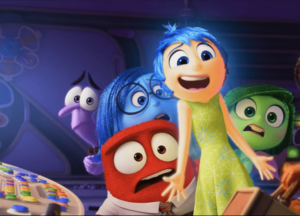We are all used to hearing about the dire plight of Gen Z. They are addicted to social media. Fragile and over-therapised. Obsessed with identity. Activists without wisdom. Reactive without nuance. That’s how the story goes. But the animal spirit of the young is more tenacious than we give it credit for. Youthful vitality, it seems, is hard to destroy.
We may over-notice a certain type of youth — brittle, indoctrinated, uncritical — only because they have been primed in a culture war. We see what we expect to see and perhaps this accounts for the gloomy and myopic view of youth many of us have. But what of the other view?
I saw a lot of another type of youth these past few months. We may have come to the end of summer now, but in my own household of teenage girls, it was decidedly a “hot girl summer”. Sleepovers. Tans. Evening bike rides. Candy salads. Nail polish. Crushes. Pop music. Pool days. Sneaking back in past curfew. I often felt that I could just as easily be watching an Eighties teen rom-com as standing in my own kitchen surrounded by young and happy high school girls. They are still frequently on their phones, using them to communicate, share funny photos, and choose their favourite new songs. But they leave their phones on their beach towels as they run to play in the water. And their phones often buzz away completely ignored, so engrossed are they in the conversations with their friends in the room. The same can’t always be said for me and my friends. We may get fewer messages, but we attend to them immediately. As for the boys who come around, they are similar to the girls: funny, daring, audacious and confident.
None of the summer’s visitors has fit the caricature of the brittle teen. The time of the “alt-girl” — the goth or “emo” who fits the picture of fragility and ethical sensitivity many of us have of teenagers — has passed. The “basic bitch” is back. She is like teen-classic. She is into hair and boys and frappuccinos. She is funny. The basic loves her body, and she isn’t shy about showing it. She is the one whose youthful vitality oozes through her pores and shines through a casual flip of her hair. The media has worked to make her uncool, though. Uncool, because pretty and strong. But “cool” moves quickly. And cool always — always — operates in rebellion to hegemonic culture. That the “alt-girl” is still portrayed as cool by the media is precisely the reason why she is now uncool. That “alt-girls” are portrayed as the ethical heroines of movies and TV is the very thing that is making them lame. This is a kind of moral pandering to teens that their animal vitality resists. Millennials — anyone over 20, for that matter — who are the promoters of ethics, are the new squares. Keep up, Boomer!
From my observations, I have come to realise a few things. Firstly, physical vanity increases sociability, which helps to form a strong individual, and in this way is preferable to moral vanity, which is often uglier and harder to cure. As Dorothy Parker pointed out, “beauty is only skin deep, but ugly goes clean to the bone.” The second is that introspection in youth is probably unhealthy. Hot girl summer, then, is a good thing.
A group of sexy, beautiful girls in the world creates its own safe space. They form a kind of closed community and look out for each other. It is called “girl code”, and the rules are pretty simple: don’t go after your friends’ crushes or exes, be honest, even if it’s hard, and always have your friends’ backs. This last one is crucial, and it is what contributes to beautiful women being safe in the world. Well-socialised males help in this regard, too. But typically, of course, the socialisation of males occurs in response to what women demand from them. Girls come and go in groups. These groups do more than keep young women protected; it makes them powerful. One feels their approach as a kind of force of nature. They talk and laugh and draw all our eyes, but they are indifferent to us. This is the source of their power: it is not simply their beauty or their confidence that makes them unapproachable. It is that they really seem to exist on another plane.
This makes them highly social creatures. And it makes them strong, as opposed to “empowered” in some political or bureaucratic sense: expert in relationships, empathy, social cues, and social graces. They feel their competency in the physical world and trust in some of nature’s benevolence. That the human brain’s prefrontal cortex, the part responsible for making considered decisions, does not fully develop until sometime in the twenties is itself just such a benevolent gift of nature. We are hardwired to first develop faith in the goodness of the world before we are able to give circumspection and prudence their proper due.
The basic girl is sensual, which is to say she takes pleasure in her senses. I watched this summer as a group of them sprinted the length of a long ocean pier before diving into the sea below without, seemingly, giving a thought or care to the way in which they might crash into each other as they landed. It was reckless… and exuberant. The hot girls of summer value physical bliss over wellbeing. The morally vain, by contrast, emphasise a body’s health rather than its delightfulness. This makes them more suspicious of risk, more alert to un-safety, less grateful, and somehow less than joyfully alive.
Most of all, hot girl summer takes a youth out of her head and into the real world. One’s own feelings take on less gravitas through girl talk, where things are analysed, commiserated with, and laughed about. Politicised ideas of sex and gender fall into the background as real dramas are discussed. What a more ideologically trained young woman might consider “toxic masculinity” is laughingly termed “being a player”. Men are condemned not for failing to have consciousness-raised gender values, but for being a “man-hoe” or “fuckboy”.
They don’t need to defer to the authority of a school administrator or a workplace bureaucracy to enforce socially acceptable sexual behaviours. They do this on their own — or rather, in their own group. The absence of any ideological background for these dynamics to operate in makes them — to borrow a word that a more ethically focused individual might choose — “authentic”. The authenticity comes precisely because the hot girls of summer are not thinking, really, of themselves, but of the interplay between themselves and others. They are vigilant about infractions on sexual norms in service not of a cause but of each other. They are too busy being girls to think about their gender identities. And too busy imposing sexual norms onto guys to think about sexual policies that should be formally implemented by institutions.
Hot summer girls are vain. They are absorbed in themselves and their own little dramas, but not necessarily in their own heads. They are superficial rather than merely shallow. But it is precisely because their self-understanding is relational and social that they are rescued from the more sinister peril of moral vanity, a type of self-regard that so easily masquerades as virtue that it usually convinces the one who has this vanity that she is righteous instead of egocentric.
Matt Feeney has recently written about the ill-effects of a film like Inside Out on a child’s or youth’s mind. His argument is, in short, that while the film is intellectually truthful and emotionally insightful, children themselves shouldn’t be trained in therapeutic self-talk and psychologised self-understanding. For some Gen Z teens, it is true, propaganda is the real origin of what they regard as their identities and values. But we shouldn’t fall into the error of thinking that this is the norm, lest we in our own way contribute to youth hyper-introspection by making the mental health youth crisis bigger than it is, validating it through our own doomsaying.
Youthful energy is a powerful force, and joy is an anti-ideological feeling. As adults we may do well to trust a bit more in the animal spirit of youth, like the teens who would hurl themselves into the sea. The antidote to fragility can’t be more moral panic about phones, media, and influencers; that is not thinking low enough. It is their animal spirit, not our ethical arguments, that might rescue Gen Z. What might smell like suntan oil and hairspray and perfume to some smells to me like the return of teen spirit.
Disclaimer
Some of the posts we share are controversial and we do not necessarily agree with them in the whole extend. Sometimes we agree with the content or part of it but we do not agree with the narration or language. Nevertheless we find them somehow interesting, valuable and/or informative or we share them, because we strongly believe in freedom of speech, free press and journalism. We strongly encourage you to have a critical approach to all the content, do your own research and analysis to build your own opinion.
We would be glad to have your feedback.
Source: UnHerd Read the original article here: https://unherd.com/




